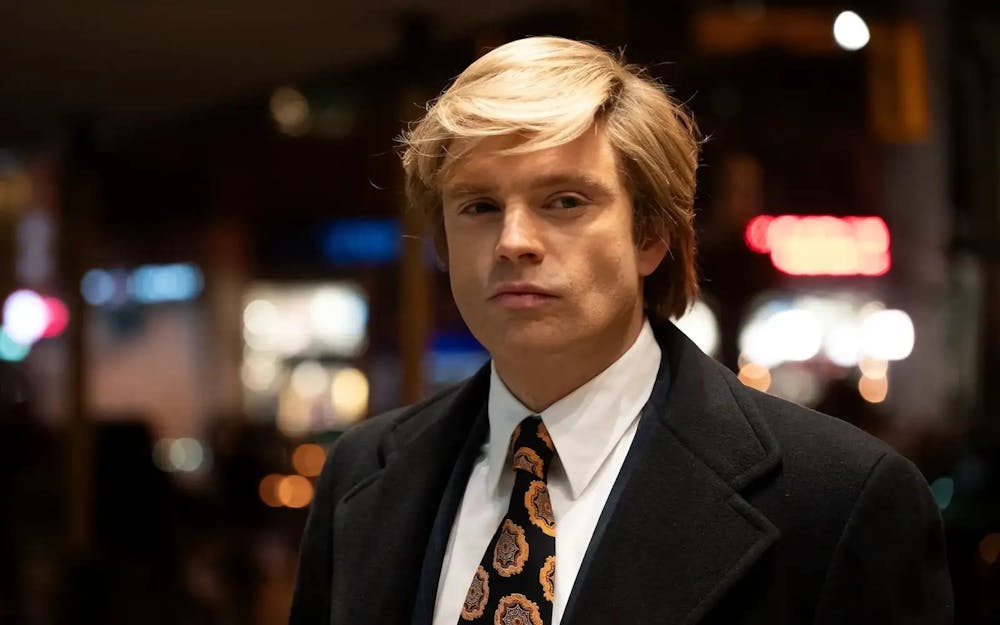In recent years, there has been an almost perverse public obsession with Donald Trump — 45th president of the United States, convicted criminal and renowned business tycoon. Ali Abbasi’s latest film, The Apprentice, explores the latter of Trump’s identities. Starring Sebastian Stan as Donald Trump, the film follows how Trump launched his career as a real estate businessman in New York City into a massive story of financial success. Particularly, it traces how he gained that success through his relationship with another figure of great controversy, Roy Cohn.
Even before the 2024 presidential election and especially now that Trump has been elected, news coverage has made it so that discussions around the man reelection are oversaturated to a degree. Regardless, people are still morbidly curious about Trump. Whether it’s concerning his private life and affairs, his time as a television personality or his political moves, Trump has been the subject of many biographical, comedic and satirical pieces of media. All this is a result of the demand for insight into the life of such a polarizing figure in popular culture.
The Apprentice premiered at the 77th Cannes Film Festival in May with relatively positive critical response and a standing ovation. However, amidst the threat of a lawsuit from Trump’s legal team and further condemnation from his campaign, the film struggled to find an American distributor until August. Trump himself has called the film “cheap,” “defamatory” and a “politically disgusting hatchet job.” In its defense, the film’s director, Ali Abbasi, has stated that he finds it important to realistically depict the impending threat of fascism, and the producers have stated they believe it is a “fair and balanced portrait” of the former president.
The film is far from cheap or defamatory, and initially, it leans more into humanizing Trump to make The Apprentice the sensible portrait it claims to be. However, there isn’t anything particularly irreverent or noteworthy that makes it a significant piece of political commentary dealing with fascism either. In its attempt to evoke further discussions on concerns about democracy or the predatory and cyclical nature of upholding power, The Apprentice lacks compelling nuance about its subject and says nothing new about its titular figure.
Donald Trump wasn’t always a polarizing political figure associated with authoritarianism, and before his presidency, public perception of him wasn’t nearly as vitriolic as it is now. The film sets us up with a more humane portrait of a young Trump in the 70s. He longs to make his absent father proud, and initially, he looks after his depressed, alcoholic older brother.
Trump’s ability to care for other people slowly begins to degrade once he takes on Roy Cohn as his mentor. When Cohn is introduced, Trump is drawn to his qualities as a winner since the former had just successfully prosecuted the Rosenbergs into a death sentence. Soon after, we see how far Cohn is willing to go to secure his reputation as a ruthless lawyer who never loses. He’ll put anyone in danger, or exploit whoever he needs to with blackmail if it means he wouldn’t have to face defeat.
As awful of a man as Cohn is, the film is the most compelling with him at its core, and his relationship with Trump as a pseudo-foil is one of the narrative’s strongest components. Trump is less of a client to Cohn, who instead views Trump as a canvas to paint into his ideal image of a powerful man.
When Cohn becomes sick with AIDS, his dynamic with Trump becomes inverted. Now holding more power than ever before as a real estate mogul of New York City, Trump has no need to respect Cohn as much as he did when Cohn was saving him from legal trouble. The shock and pain that Cohn feels because of Trump’s betrayal is humanizing but also worrying to see such a vicious figure appalled at the lack of humanity from someone else. A funeral montage of Cohn’s funeral as Trump undergoes liposuction juxtaposes how differently the futures of these similar men have played out. The scene also highlights the way Trump still seeks to improve his image while Cohn is long dead.
Outside of the Cohn and Trump relationship, the strongest component of the film is the acting behind the layered depictions of both. Sebastian Stan’s Trump gets more convincing as the runtime progresses, but from the moment he appears on screen, Jeremy Strong’s Cohn is clearly an award-worthy performance. After starring in Succession, Strong has mastered the ability of depicting a tortured and irredeemable character in an empathetic way. From Strong’s facial expressions alone, Cohn’s immeasurable pain while hiding behind a mask of placidity is conveyed in an impressively authentic manner. Even after knowing how much cruelty Cohn is capable of, Strong’s performance is still gut-wrenching.
Learned sociopathy is a cycle of those in power teaching others to abuse the system that got them there. While The Apprentice is an accurate depiction of how a monster is made under these circumstances, it does its best work in its ability to invoke sympathy — whether or not he deserves it — for a man who was still the victim of his own creation.





